“It was almost undescribable but I’ll give it a go.” Anyone from the group of athletes we have come to know as Team GB might have given voice to the thought, but the words happened to belong to Ed McKeever, one of the less charismatic of the freshly medalled guests to take his place on Gary Lineker’s sofa. Lineker, offering nightly sessions as some sort of entry-level shrink to the nation, spent the Olympic Games asking people to describe how they feel. It was a thankless gig, but someone had to keep popping the question. “Unbelievable, Gary,” they'd all say. “It’s difficult to put it into words.”
In fact you do kind of know how it feels. Those absorbed by the BBC’s coverage for the past 17 days have also been moved to a place where language doesn’t really do the job. Shouting and screaming, yes, plus sobbing, wailing, weeping. Everybody was at it (and proud of it). The whole thing has been like watching the shattering climax of Hamlet or Tristan und Isolde or Carousel, all day and every day, only there were no plot medics and story mechanics manipulating and tweaking the script. This drama was being made up in front of your eyes. And until the stay in the magical Athenian wood abruptly came to a halt, there was no bereavement. Unbelievable, Gary.
 The stock of superlatives – because, let’s face it, there are only so many to go round - ran dry long before last night’s Closing Ceremony, a raucous, rambling carnival of weirdo street theatre and high-end stadium pop that, unlike the Games themselves, outstayed its welcome. In the mean time, the task of the national broadcaster was somehow to find the words, and keep on finding them, for the vast majority who in defiance of the naysaying commentariat yearned for this colossally freighted extravaganza to take wing. An astounding 1.2 million people may have attended the athletics. That left up to 60 million or so who needed to be taken there by the BBC. These may have been the first Twitter Olympics, the first app Olympics and the first iPad Olympics, but they remained for most the same old sofa Olympics. Only this time you could curate your own coverage via the red button or, if unhappy with the main channels' patriotic pursuit of British narratives, watch the entire Graeco-Roman wrestling tourney on the BBC’s many-splendoured Olympic website. Should that be your wish.
The stock of superlatives – because, let’s face it, there are only so many to go round - ran dry long before last night’s Closing Ceremony, a raucous, rambling carnival of weirdo street theatre and high-end stadium pop that, unlike the Games themselves, outstayed its welcome. In the mean time, the task of the national broadcaster was somehow to find the words, and keep on finding them, for the vast majority who in defiance of the naysaying commentariat yearned for this colossally freighted extravaganza to take wing. An astounding 1.2 million people may have attended the athletics. That left up to 60 million or so who needed to be taken there by the BBC. These may have been the first Twitter Olympics, the first app Olympics and the first iPad Olympics, but they remained for most the same old sofa Olympics. Only this time you could curate your own coverage via the red button or, if unhappy with the main channels' patriotic pursuit of British narratives, watch the entire Graeco-Roman wrestling tourney on the BBC’s many-splendoured Olympic website. Should that be your wish.
Like every competitor, even You Know Who, the BBC will have had its own pre-performance nerves. The test event, featuring 1,000 vessels on the capital’s waterway, was an unedifying horlicks in which ignorant presenters gushed vacuously and, basically, belly-flopped. If the Diamond Jubilee had been an Olympic qualifier, the dread letters DNQ would have appeared against the BBC’s first-round attempt. Definitely No Quality. The high-ups at the BBC will now know exactly how Andy Murray felt upon returning in triumph to the scene of an immolation.
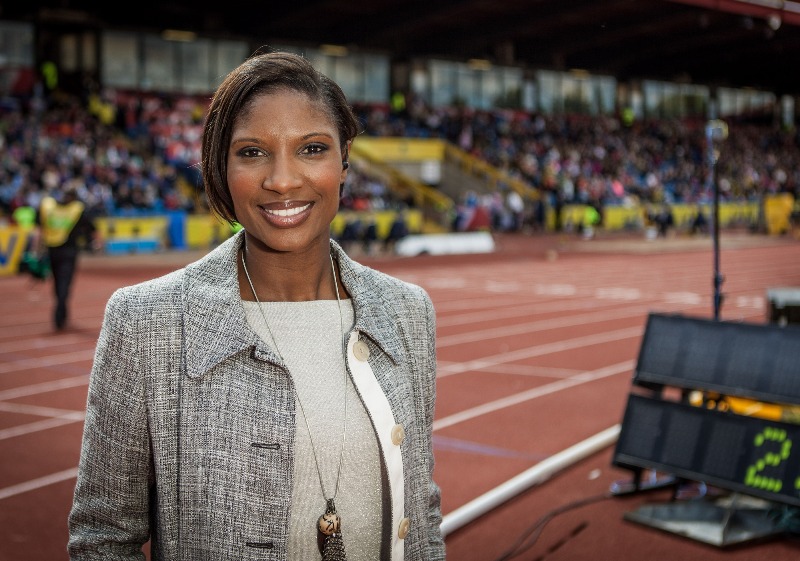 How did this happen? The basic difference between sport and pageantry is it’s much easier to come by people who know what they’re talking about in one of the above. Matt Baker (pictured above right), the Geordie presenter of The One Show who made few new friends at the Diamond Jubilee, acquired a fresh stack of them as a passionate and knowledgeable commentator on gymnastics. Who the hell knew? Of course it makes sense that former sports stars convert into unflappable live-to-camera presenters: among the newer intake joining Lineker and Sue Barker, the likes of yachtswoman Shirley Robertson and triple jumper Jonathan Edwards already know all about grace under pressure. The surprise was quite how many pundits turned out to be highly articulate analysts: the camp-as-Christmas Ocker swim champ Ian Thorpe, the hollering his’n’hers track’n’field pair of Denise Lewis (pictured above left) and Colin Jackson, Amir Khan with his jabby Bolton ringside vowels.
How did this happen? The basic difference between sport and pageantry is it’s much easier to come by people who know what they’re talking about in one of the above. Matt Baker (pictured above right), the Geordie presenter of The One Show who made few new friends at the Diamond Jubilee, acquired a fresh stack of them as a passionate and knowledgeable commentator on gymnastics. Who the hell knew? Of course it makes sense that former sports stars convert into unflappable live-to-camera presenters: among the newer intake joining Lineker and Sue Barker, the likes of yachtswoman Shirley Robertson and triple jumper Jonathan Edwards already know all about grace under pressure. The surprise was quite how many pundits turned out to be highly articulate analysts: the camp-as-Christmas Ocker swim champ Ian Thorpe, the hollering his’n’hers track’n’field pair of Denise Lewis (pictured above left) and Colin Jackson, Amir Khan with his jabby Bolton ringside vowels.
Except maybe it’s no sort of surprise at all. Every time any of Team GB’s competitors found themselves in front of a BBC microphone, you simply purred with pleasure. It wasn’t necessarily what they said; unfailingly, it was how they said it. They seemed all to have graduated cum laude from charm school. Whatever their background, schooling, ethnicity or indeed sport, they discussed technique and tactics, victory and defeat with a disarming lack of self-importance. This must be what happens when you compete for love not money.
 Meanwhile, back in the studio, the BBC’s regulars played blinder after blinder. First among them was Clare Balding, who is fast becoming sports broadcasting’s David Attenborough, an authority with a remarkable knack for communicating knowledge and passion to a vast audience. Over on Radio 5Live, Mark Pougatch, surrounded by a gobby army of former athletes, brilliantly brought the pictures to you in words. Indeed the only presenter who regularly struck a false note was Rob Walker, a Tiggerish presence at the regatta in Weymouth who seemed to have mislaid his Ritalin.
Meanwhile, back in the studio, the BBC’s regulars played blinder after blinder. First among them was Clare Balding, who is fast becoming sports broadcasting’s David Attenborough, an authority with a remarkable knack for communicating knowledge and passion to a vast audience. Over on Radio 5Live, Mark Pougatch, surrounded by a gobby army of former athletes, brilliantly brought the pictures to you in words. Indeed the only presenter who regularly struck a false note was Rob Walker, a Tiggerish presence at the regatta in Weymouth who seemed to have mislaid his Ritalin.
The BBC can make its contribution to London 2012’s legacy by keeping all these sports on our screens
Commentary often clambered up to the high plateaux once occupied by Richie Benaud and Bill McLaren, Murray Walker and Sid Waddell (the darts maestro who died this weekend). The old lags in particular had a great Games: Hugh Porter (pictured above with Chris Boardman) at the velodrome found a way of making each thrilling British win sound fresh as a daisy, while Mitch Fenner at the North Greenwich Arena fell on the first British men's gymnastics success in a century as if quenching a parched throat at a Saharan oasis. No one adorned the coverage quite like Cram. “I’ve lost my voice,” he croaked after his and 80,000 other larynxes had helped shove Mo Farah over the line for a second Saturday running.
The BBC found its voice again as a national broadcaster. Sure, it helped that there was so much good news to report, and that they know how to do sport. It's just a shame they don't get to do more of it. That’s not a plea for more football, which on the eve of a new season has never looked more like a busted flush. The BBC can make its contribution to London 2012’s legacy by keeping all these sports – the taekwondo and the keirin, the handball and the double sculling – on our screens, rather than cryogenically refrigerate them for another four years.
The other thing television can do is handle the legacy of these new heroes and heroines with sensitivity. After a fortnight in which viewers could have voted in a new one every day, there is going to be an almighty face-off at the end of the year for BBC Sports Personality of the Year. In the mean time, it would be horribly depressing if Jessica Ennis’s next primetime gig was chewing on arthropods in the Australian jungle. She’s better than that. And after all that spectacle brought to us by the BBC, so it would appear are we.
'Beautiful!' Steve Cram and Denise Lewis can't sit still for Mo Farah's last lap






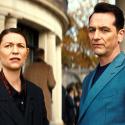
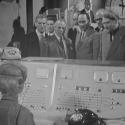



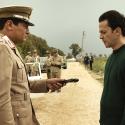


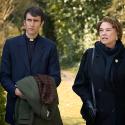
Add comment